Small pot farmers in California fear Trump — but Big Business could be a bigger threat
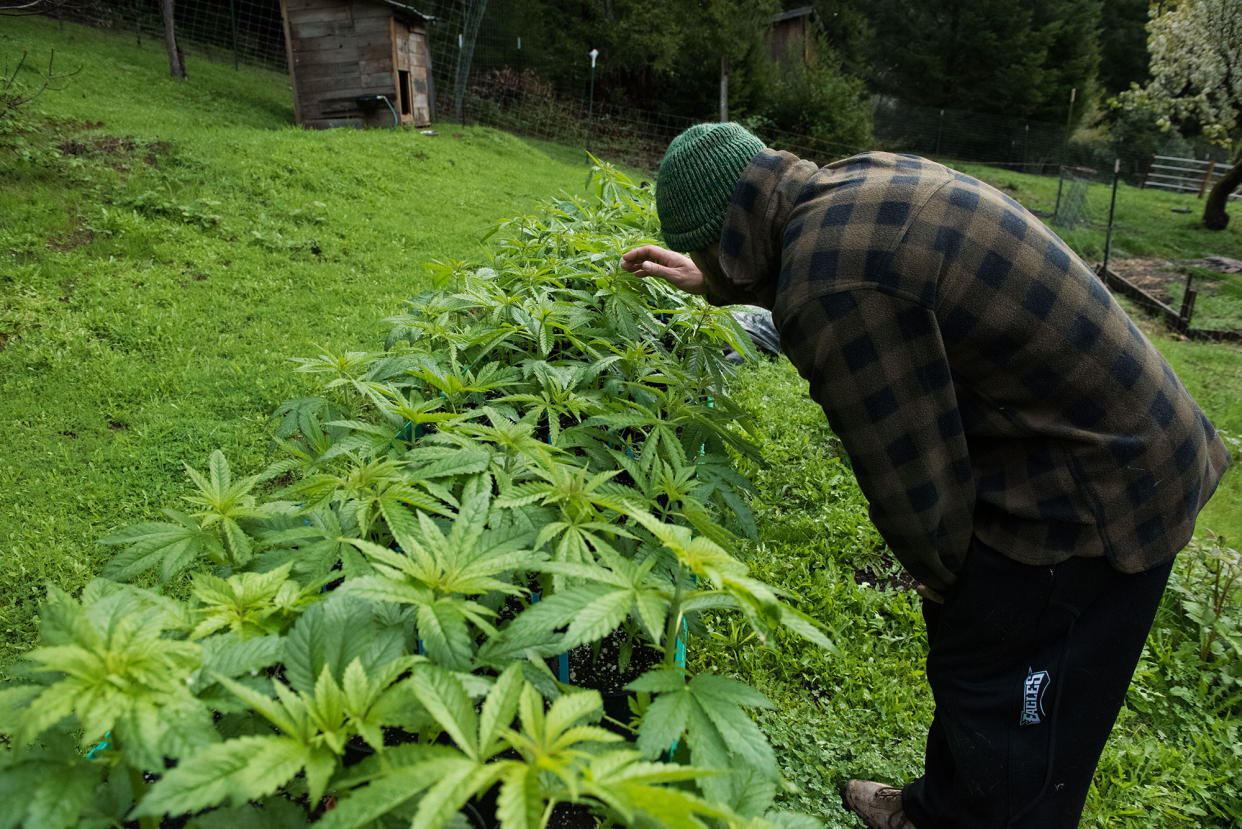
NORTHERN CALIFORNIA — Brad and Katherine live a simple life on 120 acres with two dogs, three cats, a goat, some chickens, three alpacas — and just under 2,000 square feet of marijuana plants.
Katherine’s grandparents bought the farm more than 50 years ago, and in many ways, she’s leading a life similar to theirs. She and her husband rarely make the half-hour drive down a dirt road to town, instead spending their days gardening, cooking and repairing the house. They turn off the solar electricity system every night, plunging the farmhouse into total darkness. Katherine, 31, never smokes pot — though she does bake medical marijuana dog treats for the arthritic family dog, Jake. Brad spent one recent evening reading a book called “Teaming with Microbes” and examining his latest compost concoction under a microscope.
“As soon as you weed the whole garden, you have to start over again,” Katherine said while tending to one of her many vegetable plots in the shadow of giant redwoods on a chilly March morning. She tossed the unwanted plants into a wheelbarrow. Closer to harvest time, Brad sometimes works 16-hour days, picking grasshoppers off his medical marijuana plants late into the night.
The young couple, who have asked to be identified by only their first names because of the marijuana industry’s still-precarious legal status, are worried their peaceful life in the redwoods could be turned upside down by the new administration, which has taken a harsher tone against states that have legalized pot. In 1996 California became the first state to legalize the use of marijuana for medical purposes, and a 2016 ballot initiative will allow dispensaries to sell recreational pot starting in 2018.
On the campaign trail, Donald Trump said he would defer to the states when it came to legalizing pot and endorsed medical marijuana for all states. But since taking office, both he, through his press secretary, and Attorney General Jeff Sessions have signaled they may crack down on the drug. White House press secretary Sean Spicer said states that have legalized marijuana for recreational use can expect to see “greater enforcement” of federal laws outlawing pot. Sessions said last month he believes pot legalization has led to “violence.” At a Senate hearing last year, Sessions said that “good people don’t smoke marijuana.”
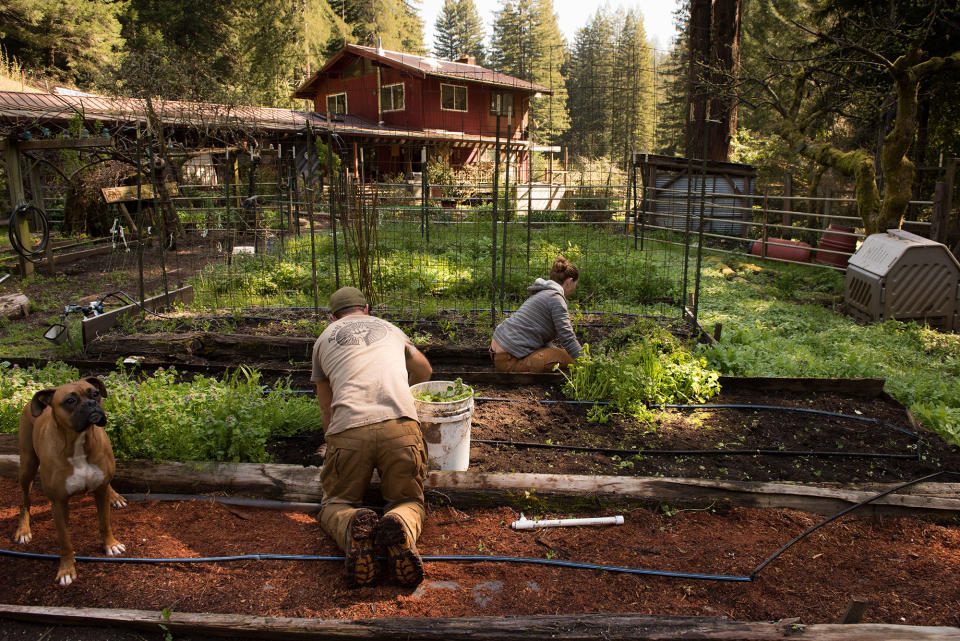
Slideshow: Small pot farms in Northern California thrive amid fears of Big Business >>>
That’s news to the people who live in Katherine’s valley, many of whom have been growing weed since the 1960s, albeit quietly. Katherine’s dad, who was a logger, started growing marijuana before she was born, a family secret that no one ever talked about in front of the kids.
As American attitudes and state laws changed to be more accepting of marijuana, Katherine’s family business also changed. In the 1970s and ’80s, her family used to “guerilla grow” — placing marijuana plants in the vast forest surrounding their property that were hidden to government helicopters prowling overhead. They hiked out soil and supplies to care for them.
Sometimes, law enforcement would beat the odds and find these hidden patches of pot, chop up all the plants and leave a business card behind. Up until a few years ago, the sound of aircraft overhead was enough to send anyone in the area into a panic.
“You’d hear a helicopter and your knees would buckle,” Brad recalled.
Katherine’s mom and dad are still incredulous that she and her husband have decided to register with the state, which they see as a huge risk though it is a requirement of the new California pot laws. (Her parents, who own a small family restaurant, moved out in 2004 and let Katherine take over the farm.) Since 2010, Katherine and Brad have grown their plants out in the open on their own property. They stay under the 2,000-square-foot limit set by local law and have invited out the Water Board and other bureaucrats to certify their operation.
“We made a garden and my parents were like, are you crazy?” Katherine recalls. “So many people are scared to go legal because they’re so used to being secretive.”
But these days the cops are no longer the greatest threat to small growers like Katherine. Instead, they worry about a danger that is far more common among entrepreneurs: competition that could put them out of business. As pot’s become increasingly mainstream, large corporations are starting to creep in on the turf of smaller, family-owned farms. It is a problem her parents’ generation never had to deal with, but it beats farming in the shadows, constantly worried about raids and arrests.

Katherine’s parents didn’t tell her about the pot until she was 16 years old, when they gradually introduced the subject after she had begun to have suspicions. (In retrospect, one clue was that her parents didn’t seem upset when she ratted out her little brother for smoking weed.) She kept the family business a secret when she first met her husband, Brad, as well, on a trip to a winery in Australia in her early 20s. Brad came to visit her family in California during pot harvest, when the valley turns into a single-minded clipping and drying operation. Migrant workers — or “trimmigrants” — show up to help cut weed for the fall months, and the local garden supply stores stock and quickly sell out of giant vats of clippers.
“When Brad first came I was like, here’s some clippers, here’s Mom and Dad,” she joked.
One grower in the valley who wished not to be named said she was “shocked” when she first came to the valley during harvest 10 years ago, expecting something seedy. Instead, entire families gathered round, clipping the plants. “It looked like something out of the 1800s in West Virginia,” she said.
Brad enthusiastically embraced he family business. In fact, once they married, he took over the pot side of the farm. He focuses on growing medical marijuana high in CBD and low in THC — the agent that makes a person feel high when smoking or ingesting pot. (Only about a quarter of Brad’s plants are recreational marijuana.) The couple makes a modest living that allows them to take a vacation each year and stay out of debt. New cars or fancy clothes are not on the table, and Katherine grows most of their food in the garden. “We don’t spend any money we don’t have,” Katherine says.
They’re also careful to diversify, since both are unsure what will happen to the marijuana industry. Brad grows and collects gourmet mushrooms that San Francisco buyers are happy to purchase, and harvests wasabi plants that get shipped to Japan for sale. They both are also considering opening up a restaurant at a local train station.
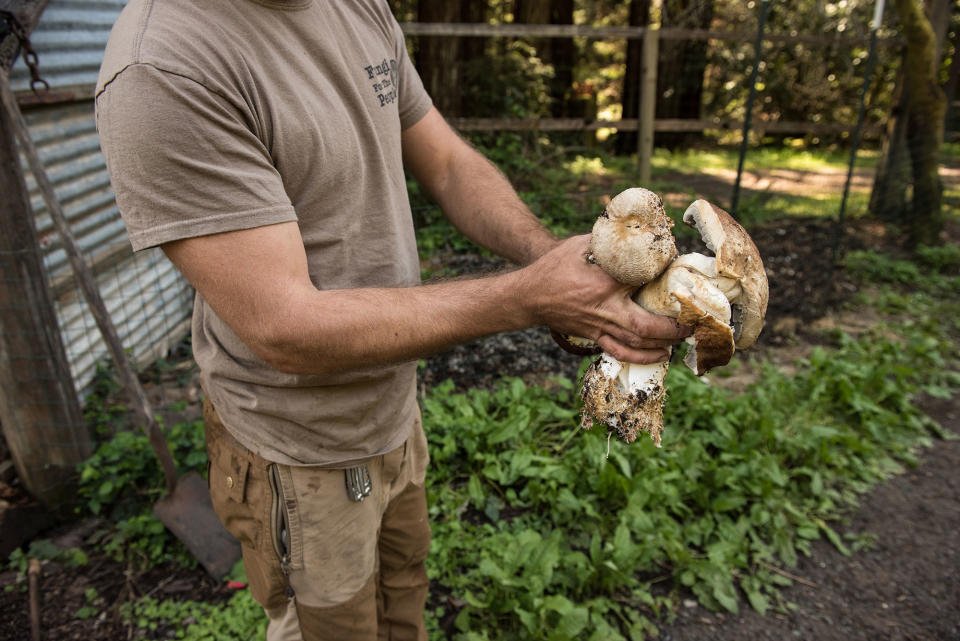
For Brad and Katherine, growing weed is a way to finance a simple country life away from the city — where they can be self-sufficient and free from the pressures of modernity.
“It’s something we can do to have this lifestyle and grow our own garden,” Katherine said.
In the valley where Brad and Katherine live, many small pot farmers fear Big Business as much as Big Government as a threat to their way of life. One in 5 Americans now live in states where it’s legal to smoke marijuana without a doctor’s note, and the legal cannabis industry is expected to rake in $22 billion by 2021. According to one analysis, about 88 percent of U.S. spending on cannabis is still in the illicit market, meaning the industry would grow at an even faster clip if more states legalize pot. The marijuana industry in Colorado alone created 18,000 full-time jobs in 2015 and sold 21,000 pounds of pot per month.
So far, most large corporations have been scared to plunge headfirst into the booming pot industry since it’s still outlawed by the federal government. But analysts predict Big Tobacco and other industries will quickly get into the mix as cannabis becomes more mainstream. Some have started pouring money into the margins of the weed industry. Last year, Scotts Miracle-Gro announced deals worth $400 million investing in garden supplies with a pot focus, and Philip Morris moved into inhaler technology.
Katherine and Brad’s biggest concern about legalization is that corporations and celebrity entrepreneurs will take over and price them and other small farmers out of the market. Whoopi Goldberg has a line of weed edibles aimed at easing period cramps. Snoop Dogg is selling clones of marijuana plants. They both think that it’s only a matter of time.

But they’re also looking forward to some of the conveniences of legitimacy after years of participating in a black market. Her parents used to sell their product to a man who would smuggle it to Chicago on the Amtrak train. They wouldn’t get paid until he sold it and came back. Now, Brad sells to a medical marijuana dispensary in Oakland, though transactions are still cash-only as banks have been wary of getting involved in activity still illegal on the federal level.
“I can’t wait to get a check. I think that would be so cool,” Katherine said. “To get a check and then deposit it.”
Pot’s a big industry now, but the valley has attracted eccentrics and freethinkers since the 1960s, when many hippies migrated there after the “Summer of Love.” Some began growing pot as a way to survive, at times clashing with local loggers who were more conservative and wary of the newcomers.
“Either you fall in love with the place or you can’t wait get to out of it,” said Mary, an 82-year-old former nun who moved to the valley in 1973. A poet, Mary was making a tincture of Grey Goose vodka and marijuana in her small kitchen on a recent afternoon to help her go to sleep.
The valley has a reputation for being inhospitable to strangers, which has helped its pot growers avoid notice and trouble. Tourists and mushroom pickers are warned away from the dirt road, which becomes a muddy mess after the slightest bit of rain.
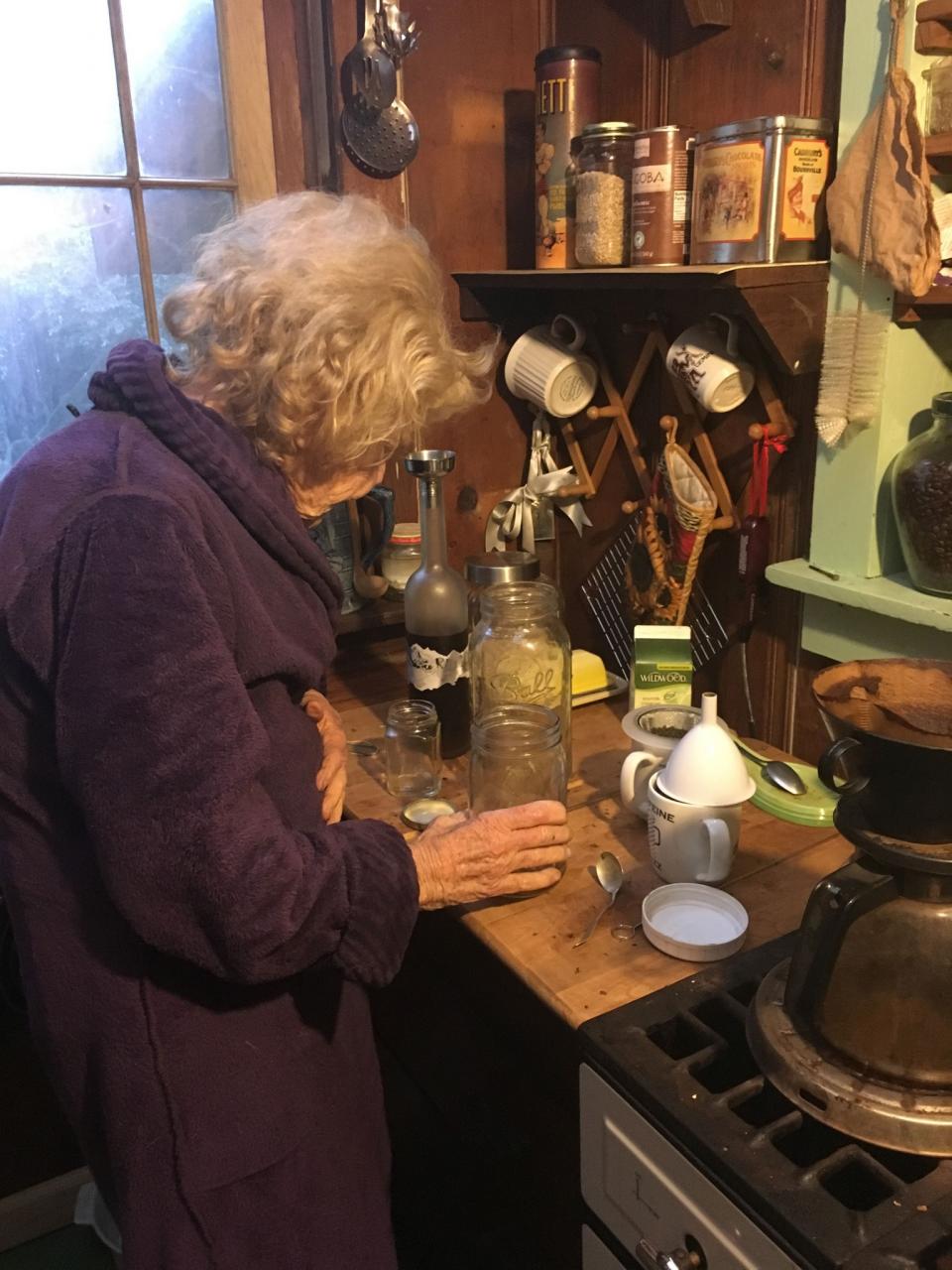
“They think in town that everyone down here is slightly psychotic,” said John, a former film producer who bought a farm in the valley six years ago.
A sign on John’s property warned: If you can read this, you’re in range.
John grows a strain of recreational marijuana that the dispensaries call “cookies” on a quarter of an acre, and employs about four people per year full time. “It’s expensive,” John says. “Everything about it is expensive.”
He jokingly describes himself as “something akin to a liberal prepper,” as in a survivalist prepping for a social or economic collapse, and decided to move his family to a farm to get closer to nature and farther away from society.
John’s worried about the rhetoric coming out of the Trump administration around pot, but his chief concern is that the web of regulations surrounding legal pot could put him out of business.
“We have goose-steppers in the White House now,” he said. “But who knows? The reality is the bureaucrats on the local level might be worse… These people are allowed to stick their nose into every aspect of your life.”
The regulations may drive out smaller farms, which can’t afford the expertise it takes to comply. “It’s becoming so complex that you need attorneys and experts and consultants to get through it, which is going to push out small growers,” John said. It’s another reason that Big Business, with all of its influence and resources, could pose the most significant threat to mom and pop pot farms.

If prices dropped much lower than they are today, he believes he would have to get out of the business. “Small farms have been killed across America,” John said, and his might be next.
Local farmers are hoping to survive by creating boutique brands that people are willing to pay extra for. “The Bordeaux of cannabis,” as John said. Katherine and Brad hope their area will become the “Napa Valley of weed” and that consumers will start to prefer organically grown pot. Before it was legal, neighbors in the valley used to never talk to each other about their cash crop. Now they swap growing tips, hoping to boost each other and survive.
Katherine is often surprised she ended up back on the farm where she grew up, fiercely committed to her quiet way of life.
“I didn’t want to have anything to do with it,” she remembers feeling as a young adult. “Then I went out and saw the world and saw how good I had it.”
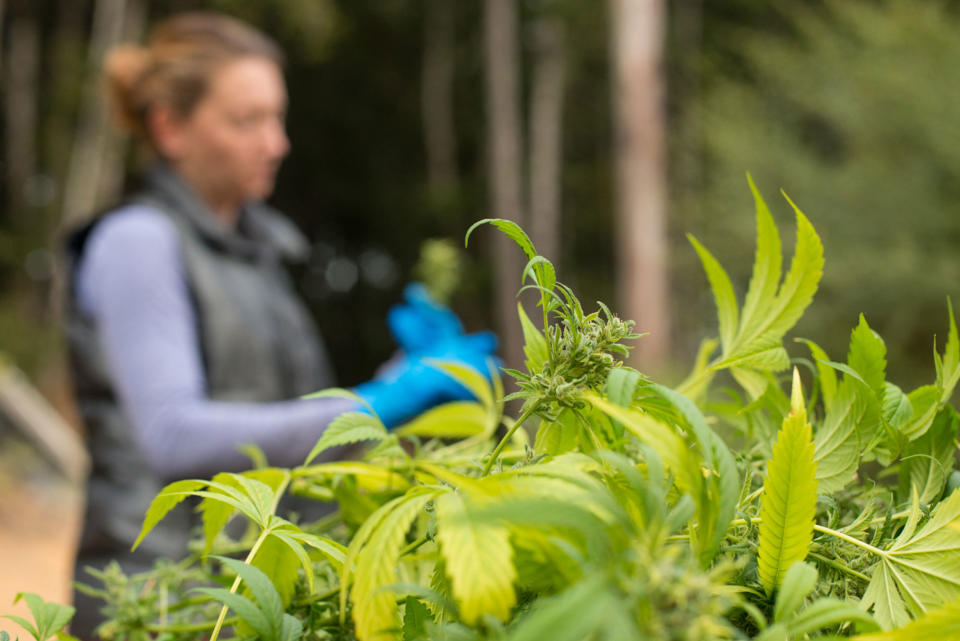
_____
Read more from the Yahoo Weed & the American Family series:
Americans families defending pot as never before, Yahoo News/Marist Poll finds
How Republicans and Democrats in Congress are joining forces to defeat Sessions’ war on weed
Cannabis advocate Melissa Etheridge: ‘I’d much rather have a smoke with my grown kids than a drink’
‘Cannabis has made me a better parent’: One mom’s confession
Photos: Small pot farms in Northern California thrive amid fears of Big Business




